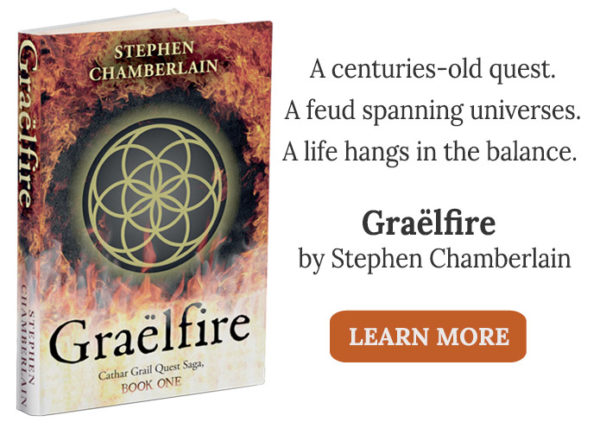“I am a determinist. As such, I do not believe in free will…I am, nevertheless, compelled to act as if freedom of the will existed. If I wish to live in a civilized community, I must act as if man is a responsible being.” – Albert Einstein
Free will is a central theme in both books of my Cathar Grail Quest Saga, Graëlfire and Graëlstorm, where the Graëlheem caste have had obedience traits bred into them through genetic modification, and each must sign a covenant compelling them to submit to the absolute authority of their creators.
Free will is the subject of countless stories. Everyone wants to be free, or at least to have some control over their lives, but does free will exist? Philosophers and theologians have debated this for years, and yet observations by neuroscientists have forced some to conclude that free will is an illusion.
Free Will
In a nutshell, free will is the power of self-determination—the capacity to act without hindrance or compulsion. As a concept, it found fertile ground in early Christian philosophy, where it was crucial to Church teachings about right and wrong, culpability and reward, judgment and punishment. At its heart, the Christian code of ethics relies on the assumption that we have moral responsibility and self-control over our actions. But such principles can only claim legitimacy if our actions are voluntary and freely chosen. If we lack free will, how can we be held accountable for not choosing the path of righteousness?
But what if free will is an illusion? What if every decision we make is inevitable, and not a conscious product of personal reason and choice?
Fate
The concept of fate asserts that we are puppets of external forces beyond our control. It has existed at least as far back as the ancient Greeks, who believed that human decisions and actions are made according to a divine, unalterable plan devised by a god. Free will did not exist, and everyone fulfilled a role like an actor performing a script—just as in the movie The Matrix, where fate is preprogrammed and non-negotiable. The Greeks were firm believers in Fate; it resonates through many of their myths and legends, where attempts to avoid it often provide the path to its fulfillment.
Belief in fate assumes that all things are predetermined, and humans are following a course that has been charted for them. But there is another theory that human choices and decisions are determined not by divine agency, but internal and external forces acting on our subconscious. This concept is called “Determinism.”
Determinism
As soon as Darwin published his theory of evolution, others wrestled with its implications: If human intellect is hereditary, and we use it to make decisions, our ability to choose is not wholly free, but depends in part on our biological inheritance.
Surprising though it may seem, some sociobiologists and neuroscientists today agree that free will is an illusion. Not because of some divine, preordained plan, but because our choices are determined according to forces over which we have no control: internal influences, such as our genes, hormonal processes, personal impulses, appetites, desires, and preferences, and external factors such as parental guidance, school, the media, and our environment, All of these act on us at the subconscious level.
Thanks to modern brain scanners, it’s now possible to observe the neural activity associated with decision-making. Some have taken these observations to confirm that we make decisions subconsciously with no conscious input, and that rather than directing the choice, our conscious mind experiences it after the event. The subconscious informs the conscious mind after we made the choice, and the brain tricks itself into believing our choices are willful.
Proponents of this version of determinism point to experiments they claim prove this, though not all scientists agree with their conclusions. In one such trial, subjects were wired up to an EEG machine and told to make random hand movements when they felt like it. They also asked them to record the time at which they intended to move their finger. During the experiment, neuroscientists recorded brain activity before the motor action was initiated, which suggested the decision to make a hand movement appeared to be determined by something outside of the subject’s perceived volition. In other words, the conscious decision hadn’t brought about the movement. A subconscious choice made before it was executed willed it to happen.
Many people find lack of free will a difficult idea to accept. As Stephen Hawking said, “I have noticed even people who claim everything is predestined, and that we can do nothing to change it, look before they cross the road.” We believe we make free choices, because we have a conscious awareness of making them, and like Neo in The Matrix, we don’t like the idea we are not in control of our lives. Believing otherwise would mean we shouldn’t punish people for wrongdoing, which would be dangerous to a society that demands personal responsibility for its protection and the maintenance of law and order. But determinists argue that this is precisely why the brain creates the illusion of free of will. Whether or not free will exists, we believe it does, which is an evolutionary advantage for civilized, social animals like us.
The Moral of the Story
Whether or not we have free will won’t be resolved any time soon. Yet the enigma hasn’t prevented authors from exploring the concept. It has long been a theme in literature and movies—whether humans should be deemed free to choose their actions and shape their lives, or whether they are determined by forces beyond their control. These can seem elusive and philosophical ideas, but stories illustrate them for us, not in abstract terms, but by throwing characters into a personal struggle and acting it out.
You see this in stories and plays from Oedipus to Romeo and Juliet, from Lord of the Rings to Harry Potter, and in the Hunger Games and The Matrix movies—characters struggling to escape their fates by choosing to take matters into their own hands, and fighting for what they believe in. Sometimes they succeed and sometimes they fail, but whether the characters lack free will is less important than how their struggle moulds them.



